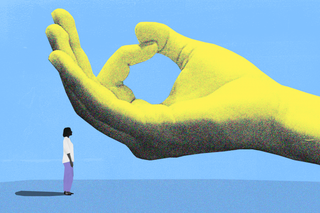
How Mindfulness Meditation Can Make Us Less Generous
“We have a responsibility as researchers to share not only the many positive effects of meditation, but also… the potential for it to occasionally relax one’s moral compass.”

The newest paragon of virtue on the block is mindfulness. Mindfulness meditation apps would have us believe that it soothes anxiety, relieves stress, and makes us better people overall. But a new study suggests that cleansing all negative emotions this way isn’t the healthiest — for us and for society. Its unintended social consequence goes like this: mindfulness helps alleviate guilt, making us less generous towards others.
“Meditating can reduce feelings of guilt, thus limiting reactions like generosity that are important to human relationships,” said lead author Andrew Hafenbrack, from the University of Washington, who studies mindfulness.
Published in the Journal of Personality and Social Psychology, the study was conducted by researchers at the University of Washington’s Foster School of Business. More than 1,400 participants from the US and Portugal were included in a series of eight experiments. Over the course of these experiments, researchers found that those who reported guilt over something they had done to harm a friend, exhibited less reparative tendencies after meditating. In other words, they were less inclined to repair the harm they had caused, and this was linked to reduced feelings of guilt — courtesy of mindfulness meditation.
“This research serves as a caution to people who might be tempted to use mindfulness meditation to reduce emotions that are unpleasant, but necessary to support moral thoughts and behavior,” said co-author Isabelle Solal, from ESSEC Business School in Cergy-Pointoise, France.
In other words, some negative emotions are necessary for us to live whole lives with other people. But mindfulness meditation “cleanses” us of all emotions that don’t make us feel good — leading to a sanitized mental palate that makes us more prone to flouting certain social necessities, and that too, unapologetically.
“Meditating for short periods of time is a tool that can make people feel better, like popping an aspirin when they have a headache… We have a responsibility as researchers to share not only the many positive effects of meditation, but also the inadvertent side effects, such as the potential for it to occasionally relax one’s moral compass,” Hafenbrack added.
Related on The Swaddle:
How Self‑Care Went From Scented Candles to Affirmations, and Why It Still Doesn’t Help
This is not the first study to note how too much of mindfulness may not be a good thing for our overall personalities. A 2021 study suggested that mindfulness can cause “heightened egotism” and make us more selfish. The more we turn inward and focus on ourselves, the less inclined we are to help others. “With the rise of apps and the use of mindfulness within corporations to increase productivity, for example, sometimes the moral dimension of mindfulness is lacking,” Michael Poulin, an associate professor in psychology at the State University of New York at Buffalo and author of the study, told BBC News.
In his findings, Poulin discovered a cultural link between mindfulness meditation and altruism. People from more interdependent-minded cultures — such as India and China, where people perceive themselves in relation to someone else — showed more altruism after mindfulness meditation than those from independent-minded cultures — such as the US and the UK — who became more self-centered after the exercise.
In light of globalization and rapidly changing cultures everywhere, however, these rooted cultural differences may dissolve.
“Mindfulness practice was intended to lead to the clear insight that despite appearing separate, all phenomena – including our sense of self – are, in their true nature, relative and interdependent,” Ronald Purser, a professor of management at San Francisco State University and a vocal critic of the mindfulness movement, told BBC News. But in its current “secular” iteration, it is marketed as a productivity hack and a “a stripped-down, DIY, self-help technique” to get ahead.
As part of the cult of self-care, mindfulness meditation joins several other practices that emphasize on the self and feelings of positivity to a fault. Self-care can, and often does, prompt us to turn away from one another and draw more boundaries, leading to unintended alienation for many, an article in The Swaddle noted earlier. The results show how “deficient we are in terms of responding to emotional needs of each other as well, structurally,” says Devika Kapoor, a Mumbai-based therapist.
But the rise of mindfulness meditation apps spells trouble for us as a society if we continue to pursue them without pause. “Instead of encouraging radical action, mindfulness says the causes of suffering are disproportionately inside us, not in the political and economic frameworks that shape how we live,” Ronald Purser writes in The Guardian, noting also that it is a $4 billion industry. Moreover, studies have increasingly shown that the positive effects of mindfulness are hyped up a lot more than their negative side-effects, and researchers are calling for greater awareness of the latter.
Being more mindful about what mindfulness can do for us, therefore, is key.
Rohitha Naraharisetty is a Senior Associate Editor at The Swaddle. She writes about the intersection of gender, caste, social movements, and pop culture. She can be found on Instagram at @rohitha_97 or on Twitter at @romimacaronii.
Related


Why We Have the Uncontrollable Urge to Spill Secrets
